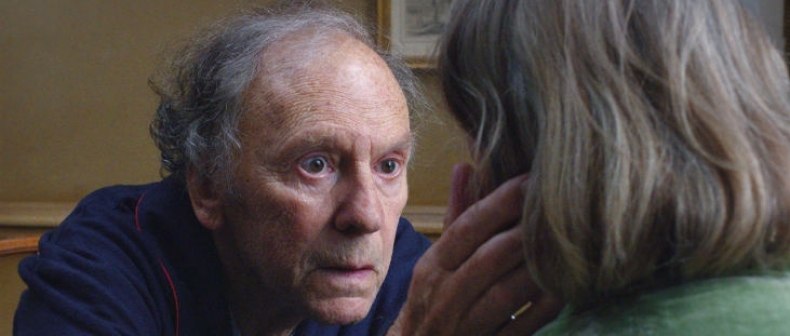
“Amour”
If someone were to invent a Geiger counter that detected irony instead of radiation, the title of Michael Haneke’s new film, Amour, would blow it to bits. As a director, Haneke (Funny Games, Caché, The White Ribbon) has no interest in love, nor a capacity for it, and his latest, about the slow, agonizing death of an old woman, is as clinical and pitiless as any of his previous pictures. He treats his lead actress, 85-year-old Emmanuelle Riva, like a lab specimen–something to be poked and prodded, then put out of its misery. The woman’s husband, played by Jean-Louis Trintignant, presumably loves her (we aren’t given much evidence either way, beyond his steadfast dedication to her), but his face is a mask of helpless incomprehension and fear most of the time. As several others have pointed out, Amour is essentially a horror movie. Like David Cronenberg’s The Fly, it’s about the betrayal of the body and the terror of decay. In order to experience it as a tender, sad love story–which is how many people are experiencing it–you have to ignore pretty much everything Haneke is saying with his directorial choices.
It’s understandable that we want to see Amour as more touching than it is. We almost need to just to get through it. From the first scene on, it’s a relentless death march, the end laid out in advance just in case we had any doubts. The opening shot is of firemen battering down the door to Anne and Georges’ well-appointed Parisian apartment. Inside, they get a whiff of something nasty and discover Anne’s visibly rotting corpse arranged on a bed, surrounded by flowers. (The only mystery: where’s Georges?) From there, Haneke turns back the clock by several months (possibly more–there’s no timeline) to show the couple enjoying their last illness-free evening out: a piano recital at the Thétre des Champs-Elysees. Anne and Georges, we later learn, are both retired music teachers, and the pianist is one of Anne’s former students.
Though the movie has barely begun, already the possibility of love is being called into question. (And by “love” I mean all kinds of love, not just romantic love.) When Anne and Georges go to visit the pianist backstage, they’re stiff and impersonal with him; later, after they’ve returned home, Anne appraises the young man’s performance in the most dispassionate way possible: “Incredible semiquavers in the presto.” Also, we can’t help but notice that Anne and Georges are dressed all in black, and that their apartment–which we remain in for the rest of the film–is so stuffed with classical music CDs, albums, and other tony bric-a-brac that it’s like they’ve walled themselves in. As in his other bourgeoisie-baiting films, Haneke is showing how the upper classes use culture and refinement to shut out the world–how culture becomes, for them, a substitute for love rather than an expression of it.
The next morning, Anne suffers her first setback: temporary catatonia brought on by a blocked artery, soon to be followed by two strokes. Yet Haneke doesn’t soften towards them, or us. Indeed, he’s just getting started, and his aim is to be as unconsoling as possible. He wants to prove the sentimental-types wrong by demonstrating that there is nothing beautiful about death, and that illness does not bring people closer together. Though Georges is shown to be a dedicated caretaker, the emphasis is on the wedge driven between him and Anne. When Anne, semi-paralyzed, leafs through an old photo album with her one good hand, Georges doesn’t join in the trip down memory lane; he silently scolds her for being morbid. Later, when Anne won’t drink from her sippy-cup, he slaps her across the face, hard. Things are even more tense between Georges and the handful of outsiders we meet. Their daughter, played by Isabelle Huppert, is a constant annoyance rather than a help, and a nurse Georges hires is so incompetent (according to Georges) that he fires her in a nasty, heated exchange.
To an extent, I can appreciate what Haneke is saying here. Death doesn’t necessarily bring out the best in people, the way it does in movies, and love is no defence against it. But Haneke is so determinedly downbeat that the movie feels as fraudulent as the cheesiest, most sentimental Hallmark Hall of Fame movie. In Haneke’s world, there are no consoling moments in the face of pain, only horror and misery. (Just wait until you see how Haneke chooses to depict Anne’s death.) I assume I’m not alone in believing that, no matter how horrible life gets, there are always consolations, even if only small ones. Not only does Haneke insist otherwise, he shoves our faces in non-stop “proof” that we’re wrong. To him, “truth” is synonymous with the worst.
Throughout Amour, I kept thinking of other, better end-of-life films like Away From Her and Wit, and documentaries like How to Die in Oregon, Near Death, and Dying at Grace, all of which are clear-eyed and utterly devoid of sentiment, yet somehow manage to avoid nihilism. They find moments of grace, even transcendence, amid the suffering, whereas Haneke insists that grace and transcendence are just illusions for chumps. Amour is a work of art only if you believe that art and misanthropy are compatible.
____
Scott MacDonald writes about cinema for Toronto Standard. You can follow him on Twitter at @scottpmac. He just started tweeting, so be gentle with him.
For more, follow us on Twitter @TorontoStandard and subscribe to our newsletter.














